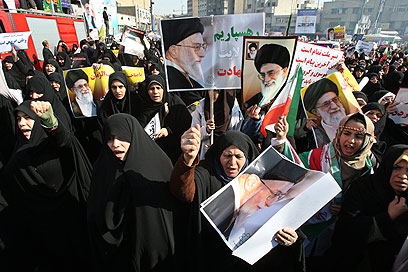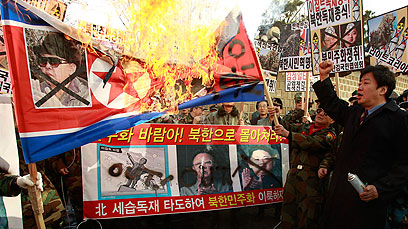



While the people of Jordan, Yemen, Saudi Arabia, Bahrain and Iraq have been inspired by these successful uprisings to raise their heads and tell their rulers that they have had enough, the question remains whether other nations under totalitarian or falsely democratic regimes can turn into the sites of the next rebellion.
Ahmadinejad's iron grip
Over the past two weeks, the opposition movement in Iran has made attempts to ride the wave of the Middle East upheaval and renew the protest against the Islamic dictatorship. But just like the Green Movement protests that were triggered by 2009's disputed elections, this last attempt at an uprising was suppressed by heavy fire on the part of the security forces, killing a number of protestors in the process.
"In Iran, the ruling mechanisms are bigger and better-oiled than those in the Arab nations," says Dr. Uzi Rabi, the chairman of Tel Aviv University's Department of Middle Eastern and African History.
While Tunisia, Egypt and Libya have seen many cases of soldiers defecting to the anti-government protestors' side, chances that the same will happen in the Islamic Republic are scarce. "The Revolutionary Guard and the Basij (the Revolutionary Guard's volunteer corps), identify with the ideology of Tehran's regime, which has a wide base of supporters," Rabi says.

Pro-regime protests in Iran (Photo: AP)
While in Egypt the opposition movements were an inseparable part of the mass protest that toppled Mubarak's regime, the same might not be true for Iran. The reason? Opposition parties do not exist in Iran.
Accoridng to Rabi, despite many people's identification with the Iranian Green Movement, Ahmadinejad's iron grip does not allow it much space to create the change that has ocurred in other places in the Arab world.
According to Rabi, despite the faltering economy, which has caused high unemployment and inflation rates, the regime in Tehran remains strong.
"It has a wide ideological wingspan, and it is under the impression that it can use the latest events in the Middle East to achieve a significant foothold in the region," Rabi says. "Basis for this can be found in the passage of the Iranian ships through the Suez Canal earlier this week, and the Iranian involvement in the politics in Lebanon and other Arab nations."
But despite the regime's display of power, it is not impervious to criticism, which might allow it to be dragged into a state of instability.
"The regime in Tehran must give response to the needs of the local population," Rabi says. "The numerous financial problems in the nations are a 'worm' that is eating away in the government's legitimacy."
In fact, Rabi claims that Iranian President Mahmoud Ahmadinejad is using the recent developments in the region to distract the public from the financial, political and social problems, with mixed results.
"It is quite possible that these problems will threaten the stability of the regime," Rabi says.
Lack of unity in Syria
Earlier in February, activists attempted to use online social networks to promote a Syrian "Day of Rage" against President Bashar Assad. But the Facebook page opened for the "Syrian Revolution 2011" to "end corruption and tyranny," which got more than 12,000 Likes, failed to draw supporters out, and the only thing washing over the streets following Friday prayers was rain, not rallies.
Dr. Mordechai Kedar, a lecturer at Bar Ilan University's Arabic Department and a senior researcher at the Begin-Sadat Center for Strategic Studies, blames the failure for a significant anti-Assad protest on the lack of unity and cooperation between opposition groups in Syria, and their weakness facing the regime's stronghold.
"From the late 1970s to the early 1980s, the Syrian regime managed to eradicate the Muslim Brotherhood in the country almost entirely, and has killed approximately 30,000 people who were part of the opposition movement," Kedar says.

With weak opposition, Assad's not worried (Photo: AFP)
According to Kedar, the severe limitations placed by the Syrian authorities on the Internet are making the organization of a popular protest difficult.
"The recent revolutions in the Arab world are a result of events that ripened slowly – as per the nature of this world – and in my opinion everything that happens these days is belated response to the fall of Saddam Hussein's regime in Iraq," adds Kedar, who two months ago estimated on his blog that the New Year's Eve attack on the Coptic church in Alexandria will lead to Egypt's "Iraqization."
Kedar refuses to predict that the same fate will befall Assad that did Mubarak, but says that "anything can happen. We cannot disregard anything, but we cannot base conclusions for the future on the past."
North Korea's isolation
Its economy is in shambles, its residents have been suffering from severe shortages and poverty, but its rulers refuse to ask for international aid. Add this to brutal, systematic human rights violations, and you get the recipe a revolution in North Korea. But not everyone thinks so.
"The current leadership in North Korea is strong enough to defend itself against a popular uprising the likes of which have broken out across the Arab world," says Dr. Guy Podoler, an Asian Studies professor at Haifa University. "Kim Jong-un, the next ruler of the nation and the son of Kim Jong-il, is strong enough to keep hold on the reins on his country."
Podoler lists two main reasons for his assertion that the revolt outbreak will not spread to the isolated communist nation.
"North Korea is an entirely closed off nation, in all sense," he says. "It doesn't have Internet, the citizens don't have computers and the only television channels belong to the regime.
"Anyone who thinks that the voice of the protest can be found on the waves of the ether – on pirate radio stations, for example – is doomed for failure."
According to Podoler, the radio transmitters possessed by North Koreans are fixed to government frequencies, and the authorities frequently search private homes to make sure that that it remains this way.

Anti-Kim Jong-il protest in Seoul, S. Korea (Photo: AFP)
But what about North Koreans who have spent time abroad and returned to their homeland? Couldn't they bring news of the revolutions shaking up the Middle East to their fellow citizens? Podoler says that returnees are given "special therapy" to determine how influenced they are by what they have seen abroad.
"The authorities check for the possibility that these people can pose a danger to the regime, and those who are identified as 'dangerous' disappear, and no one knows what fate they meet," Podoler says. This is what happens when Pyongyang does not want to take any risks.
Another reason that Podoler says will make the upheaval skip over North Korea is that the government has succeeded to smoothly transfer power from Kim Jong-il to his son. Kim Jong-un's resume has been padded with many flattering titles; he was recently promoted to the rank of four-star general - even though he has not served in army as his father did – and was moved up to the position of vice chairman of the National Defense Commission.
"In order to secure his position, Kim junior was assisted by the generals who are close to his father," Podoler says. "So far, it seems to work."
And anyone who thinks that the recent provocations on the part of the North Korean government – the sinking of a South Korean ship last year and the bombing of the Yeonpyeong Island this past November – were intended to demonstrate the nation's power to the world, is apparently missing the real point.
"These last provocations were meant to send a message to the North Korean people: Don't mess with us! Don't even think on going out to the streets and protest,'" Podoler claims.
- Follow Ynetnews on Facebook















